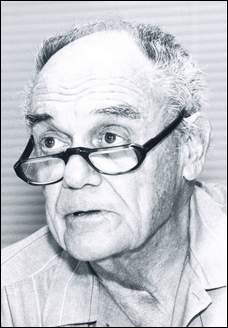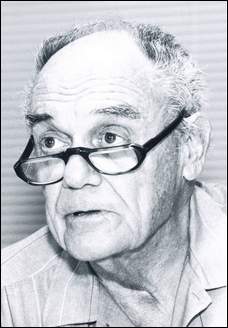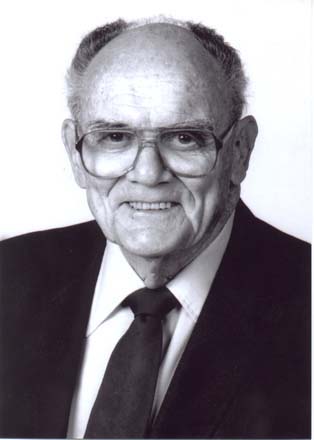Respected by colleagues, constituents, Democrat left his mark on county, state
By GAYE LEBARON
THE PRESS DEMOCRAT
Justice Joseph A. Rattigan, whose unabashed pride in American democracy and the rule of law made him a respected figure in California judicial and legislative circles, died Saturday at his Santa Rosa home after a long illness. He was 87.
Rattigan, who served two terms in the state Senate from Sonoma County and 18 years as justice of the Northern California district of the state Court of Appeal, was one of a generation of young lawyers who came to California at the end of World War II and whose roles in government changed the political direction of the state.
Retired Sonoma County Judge Joseph P. Murphy called his longtime friend and colleague "a monumental figure in terms of his public service."
"He was respected not only for his integrity and his intellect, but for his ability to tackle complex legislative matters and transform them into legislation," Murphy said. "As a judge, he was completely his own man. He did all his own work, wrote all his own opinions and was just the personification of excellence."
A Lincolnesque figure known for his eloquent oratory and skills as a raconteur, Rattigan traced his love of politics to his youth in Washington, D.C., where his father was a law partner of Sen. Joseph O'Mahoney of Wyoming.
Rattigan graduated from Catholic University in 1940 and worked for a brief time -- until Pearl Harbor -- as an economist for the Department of Agriculture. That stint with the executive branch would support his whimsical boast in later years that he had served in all three branches of government.
A decorated Navy veteran of World War II, he was an intelligence officer in Central and South America and commanded a PT boat in seven campaigns in New Guinea, the Moluccas and the Philippine Islands.
Discharged in 1945 with a decoration for heroism in combat, he entered Stanford Law School. He graduated in 1948 and after a brief time practicing in Ukiah, joined the Santa Rosa law firm of Geary, Spridgen & Moskowitz. Active in Democratic politics and civic affairs, he was Adlai Stevenson's county chairman in 1956, was president of the Sonoma County Bar Association and served as a member of the city's Board of Public Utilities from 1956-58.
Youngest senator
He was part of the Democratic sweep in the Legislature that came with the election of Governor Edmund G. "Pat" Brown in 1958. At age 38, Rattigan became the youngest senator in the history of the county, defeating the incumbent, F. Presley Abshire of Geyserville. He served two four-year Senate terms in the years when California was in transition, becoming the nation's most populous state while facing the effects of such runaway growth.
In his terms in the Legislature, Rattigan wrote several major bills on law enforcement, local government, education, agricultural marketing and welfare. He served as chairman of the Senate committee on local government from 1961-66.
He was the principal author of the Rattigan-Burton Act, establishing California's first -- and the nation's largest -- state program of medical care for the elderly, generally regarded as a parent of the federal Medicare system.
His legislation also created the Department of Rehabilitation, which provides training and jobs for the physically disabled. He co-wrote the Master Plan for Higher Education, which established the current state university system, and the Public Library Development Act.
In 1960, in a suspense-filled, eleventh-hour, stop-the-clock, now-or-never maneuver, Rattigan's Senate Bill 43 was passed, creating Sonoma State College.
In his first year in the Senate, he was named the "outstanding new legislator," and, in 1963, the San Francisco Chronicle termed him "the Senate's most respected legal mind."
Then-Senate President pro-tem James Mills, who wrote about the Legislature of the 1960s in his 1987 book, described his colleague Rattigan as "the most universally respected man in either house of the Legislature, just as today is he is perhaps the most universally respected appellate court justice in California."
Rattigan also carried the one-man, one-vote reapportionment measure that, ironically, split Sonoma County into two senatorial districts and cost him his seat. In later years he liked to joke that he was the "last Sonoma County senator, the end of a long line that began in 1850 with Mariano Guadalupe Vallejo."
He took great pride in representing Sonoma County and often celebrated its history in speeches and interviews, remembering that he had the privilege of knowing not only a grandson of Gen. Vallejo but the widows of both Jack London and Luther Burbank.
Key appellate rulings
As a justice, Rattigan participated in more than 3,000 appellate decisions, many of them as important and far-reaching as his legislation. He ruled in favor of separation of church and state, despite his strict Catholic background, in an opinion enjoining the governor from closing state offices on Good Friday, a decision that made the front page of Cairo's English-language newspaper.
He also wrote the decision that overturned the murder conviction of Black Panther leader Huey Newton, who was found innocent in his retrial. Another Rattigan decision required cities and counties to adopt a general plan and abide by it in planning and zoning. Another allowed taxpayers to sue counties over irresponsible development.
He was justifiably proud of a dissenting opinion that subsequently was adopted by the U.S. Supreme Court in a decision that quoted him by name.
"I used to observe him in the law library here," Murphy recalled. "Law students and young lawyers would come up and talk to him and he was, without exception, generous in his advice and his ability to share their concerns. He was simply always available for counsel."
In 1989, five years after he retired from the appellate bench, he was appointed to the Fair Political Practices Commission, where he promptly established himself as a hard-liner, calling for stiffer penalties for miscreants.
'Angered by discrimination'
Rattigan, as both legislator and jurist, dedicated his life to the rights of the disenfranchised. Born Jan. 24, 1920, he inherited an Irish sense of righteousness and his upbringing in a southern city set him firmly on the side of civil rights.
"I never went to school with a black person. I never went to a motion picture theater where there was a black person," he told an interviewer in 1993, "and I was always very much angered by racial discrimination."
When he participated in the Senate's consent to the Rumsford Fair Housing Act in 1963, he recalled that he went to the back of the chamber, and hugged his wife Betty. With tears in his eyes, he said, "I have just atoned for a Jim Crow boyhood."
Another source of pride was his long and consistent opposition to capital punishment. It was an issue he first argued as a freshman senator when he called his colleagues to account in the last-ditch, unsuccessful effort to save convicted kidnapper Caryl Chessman from the gas chamber.
Later, he would confide, without apology, that he suspected his stand against the death penalty had cost him a seat on the state Supreme Court.
Known for an intellect that one interviewer termed "near-encyclopedic," Rattigan was called upon often by reporters for comments on political issues and judicial appointments and served as a mentor to two generations of judges, lawyers and Democratic politicians,
Woolsey mentor
U.S. Rep. Lynn Woolsey recalled the day in 1992 when she first ran for Congress in a field of nine Democratic Party candidates and Rattigan volunteered his wholehearted support and endorsement when she hadn't even dreamed of asking for it.
"He gave me the confidence that I needed. I took his counsel very seriously," Woolsey said late Saturday evening when informed of her mentor's passing. "We have just lost one of the real greats in Sonoma County history, someone whom you could trust, who would be candid and always honest with you."
In 1997 he received another singular honor when the State Building in Santa Rosa was named in his honor. The building stands next to the John F. Shea Federal Building, named for his good friend and fellow Democrat Jack Shea, and at the dedication ceremony Rattigan joked that it constituted a "black Irish merger.
He is survived by his wife, Elizabeth "Betty" Rattigan. They were married in 1942 after a courtship that began in their second-grade classroom. He is also survived by his daughters, Catharine Kalin and Anne Paine, both of San Francisco; sons Michael Rattigan of Sacramento, Thomas Rattigan of San Francisco, Patrick Rattigan of Santa Rosa and Timothy Rattigan of Bellevue, Wash.; and 12 grandchildren.
Published: Sunday, May 13, 2007 in The Press Democrat.
Respected by colleagues, constituents, Democrat left his mark on county, state
By GAYE LEBARON
THE PRESS DEMOCRAT
Justice Joseph A. Rattigan, whose unabashed pride in American democracy and the rule of law made him a respected figure in California judicial and legislative circles, died Saturday at his Santa Rosa home after a long illness. He was 87.
Rattigan, who served two terms in the state Senate from Sonoma County and 18 years as justice of the Northern California district of the state Court of Appeal, was one of a generation of young lawyers who came to California at the end of World War II and whose roles in government changed the political direction of the state.
Retired Sonoma County Judge Joseph P. Murphy called his longtime friend and colleague "a monumental figure in terms of his public service."
"He was respected not only for his integrity and his intellect, but for his ability to tackle complex legislative matters and transform them into legislation," Murphy said. "As a judge, he was completely his own man. He did all his own work, wrote all his own opinions and was just the personification of excellence."
A Lincolnesque figure known for his eloquent oratory and skills as a raconteur, Rattigan traced his love of politics to his youth in Washington, D.C., where his father was a law partner of Sen. Joseph O'Mahoney of Wyoming.
Rattigan graduated from Catholic University in 1940 and worked for a brief time -- until Pearl Harbor -- as an economist for the Department of Agriculture. That stint with the executive branch would support his whimsical boast in later years that he had served in all three branches of government.
A decorated Navy veteran of World War II, he was an intelligence officer in Central and South America and commanded a PT boat in seven campaigns in New Guinea, the Moluccas and the Philippine Islands.
Discharged in 1945 with a decoration for heroism in combat, he entered Stanford Law School. He graduated in 1948 and after a brief time practicing in Ukiah, joined the Santa Rosa law firm of Geary, Spridgen & Moskowitz. Active in Democratic politics and civic affairs, he was Adlai Stevenson's county chairman in 1956, was president of the Sonoma County Bar Association and served as a member of the city's Board of Public Utilities from 1956-58.
Youngest senator
He was part of the Democratic sweep in the Legislature that came with the election of Governor Edmund G. "Pat" Brown in 1958. At age 38, Rattigan became the youngest senator in the history of the county, defeating the incumbent, F. Presley Abshire of Geyserville. He served two four-year Senate terms in the years when California was in transition, becoming the nation's most populous state while facing the effects of such runaway growth.
In his terms in the Legislature, Rattigan wrote several major bills on law enforcement, local government, education, agricultural marketing and welfare. He served as chairman of the Senate committee on local government from 1961-66.
He was the principal author of the Rattigan-Burton Act, establishing California's first -- and the nation's largest -- state program of medical care for the elderly, generally regarded as a parent of the federal Medicare system.
His legislation also created the Department of Rehabilitation, which provides training and jobs for the physically disabled. He co-wrote the Master Plan for Higher Education, which established the current state university system, and the Public Library Development Act.
In 1960, in a suspense-filled, eleventh-hour, stop-the-clock, now-or-never maneuver, Rattigan's Senate Bill 43 was passed, creating Sonoma State College.
In his first year in the Senate, he was named the "outstanding new legislator," and, in 1963, the San Francisco Chronicle termed him "the Senate's most respected legal mind."
Then-Senate President pro-tem James Mills, who wrote about the Legislature of the 1960s in his 1987 book, described his colleague Rattigan as "the most universally respected man in either house of the Legislature, just as today is he is perhaps the most universally respected appellate court justice in California."
Rattigan also carried the one-man, one-vote reapportionment measure that, ironically, split Sonoma County into two senatorial districts and cost him his seat. In later years he liked to joke that he was the "last Sonoma County senator, the end of a long line that began in 1850 with Mariano Guadalupe Vallejo."
He took great pride in representing Sonoma County and often celebrated its history in speeches and interviews, remembering that he had the privilege of knowing not only a grandson of Gen. Vallejo but the widows of both Jack London and Luther Burbank.
Key appellate rulings
As a justice, Rattigan participated in more than 3,000 appellate decisions, many of them as important and far-reaching as his legislation. He ruled in favor of separation of church and state, despite his strict Catholic background, in an opinion enjoining the governor from closing state offices on Good Friday, a decision that made the front page of Cairo's English-language newspaper.
He also wrote the decision that overturned the murder conviction of Black Panther leader Huey Newton, who was found innocent in his retrial. Another Rattigan decision required cities and counties to adopt a general plan and abide by it in planning and zoning. Another allowed taxpayers to sue counties over irresponsible development.
He was justifiably proud of a dissenting opinion that subsequently was adopted by the U.S. Supreme Court in a decision that quoted him by name.
"I used to observe him in the law library here," Murphy recalled. "Law students and young lawyers would come up and talk to him and he was, without exception, generous in his advice and his ability to share their concerns. He was simply always available for counsel."
In 1989, five years after he retired from the appellate bench, he was appointed to the Fair Political Practices Commission, where he promptly established himself as a hard-liner, calling for stiffer penalties for miscreants.
'Angered by discrimination'
Rattigan, as both legislator and jurist, dedicated his life to the rights of the disenfranchised. Born Jan. 24, 1920, he inherited an Irish sense of righteousness and his upbringing in a southern city set him firmly on the side of civil rights.
"I never went to school with a black person. I never went to a motion picture theater where there was a black person," he told an interviewer in 1993, "and I was always very much angered by racial discrimination."
When he participated in the Senate's consent to the Rumsford Fair Housing Act in 1963, he recalled that he went to the back of the chamber, and hugged his wife Betty. With tears in his eyes, he said, "I have just atoned for a Jim Crow boyhood."
Another source of pride was his long and consistent opposition to capital punishment. It was an issue he first argued as a freshman senator when he called his colleagues to account in the last-ditch, unsuccessful effort to save convicted kidnapper Caryl Chessman from the gas chamber.
Later, he would confide, without apology, that he suspected his stand against the death penalty had cost him a seat on the state Supreme Court.
Known for an intellect that one interviewer termed "near-encyclopedic," Rattigan was called upon often by reporters for comments on political issues and judicial appointments and served as a mentor to two generations of judges, lawyers and Democratic politicians,
Woolsey mentor
U.S. Rep. Lynn Woolsey recalled the day in 1992 when she first ran for Congress in a field of nine Democratic Party candidates and Rattigan volunteered his wholehearted support and endorsement when she hadn't even dreamed of asking for it.
"He gave me the confidence that I needed. I took his counsel very seriously," Woolsey said late Saturday evening when informed of her mentor's passing. "We have just lost one of the real greats in Sonoma County history, someone whom you could trust, who would be candid and always honest with you."
In 1997 he received another singular honor when the State Building in Santa Rosa was named in his honor. The building stands next to the John F. Shea Federal Building, named for his good friend and fellow Democrat Jack Shea, and at the dedication ceremony Rattigan joked that it constituted a "black Irish merger.
He is survived by his wife, Elizabeth "Betty" Rattigan. They were married in 1942 after a courtship that began in their second-grade classroom. He is also survived by his daughters, Catharine Kalin and Anne Paine, both of San Francisco; sons Michael Rattigan of Sacramento, Thomas Rattigan of San Francisco, Patrick Rattigan of Santa Rosa and Timothy Rattigan of Bellevue, Wash.; and 12 grandchildren.
Published: Sunday, May 13, 2007 in The Press Democrat.
Sponsored by Ancestry
Advertisement
Explore more
Sponsored by Ancestry
Advertisement




